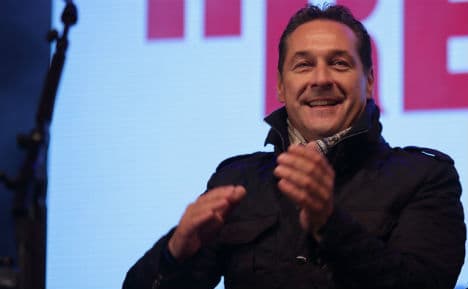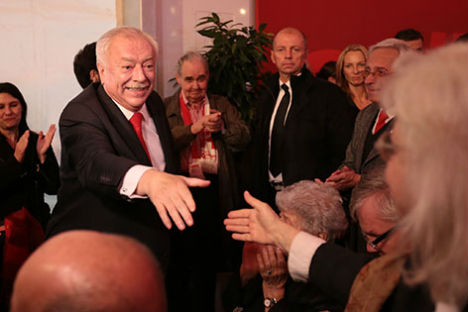Could far-right leader conquer 'red' Vienna?

Boosted by a surge in popularity in the wake of Europe's refugee crisis, the leader of Austria's far-right Freedom Party, Heinz-Christian Strache, hopes to finally break the Socialists' 70-year reign in Vienna in Sunday's regional election.
"Let's roll up our sleeves and do this, out of love for our home town, out of love for the people of this city! We will succeed, I can feel it," he told a large rally in front of St Stephen's Cathedral on Thursday, calling the ballot a "historic chance".
Among those applauding the rousing speech was Claudia, an unemployed accounting secretary who said she hadn't been able to find "a real job" for the past four years.
"This time we stand a chance of being heard. People realise that the real defender of workers' rights is him," she said.
A decade after the tall, blue-eyed Strache took the reins of the FPÖ, his dreams of glory no longer seem far-fetched.
Latest polls show his party has drawn nearly level with the centre-left Social Democrats (SPÖ), who have governed the Austrian capital since the end of World War II.

Häupl has been in power for 21 years. Photo: ORF/Roland Winkler
At the last city election five years ago, the Socialists took 44.3 percent of the vote, with the FPÖ lagging more than 18 points behind.
Now 46-year-old Strache narrowly trails Vienna's Socialist mayor Michael Häupl, who has been in power for 21 years, by only a point in the polls.
"The gap between the two parties is narrowing all the quicker as the projected seven-point gain for the FPÖ coincides with a comparable erosion for the (Socialists of the) SPÖ," political analyst Marcelo Jenny told AFP.
Latent xenophobia
But -- and it's an important but -- even if Strache wins Sunday's vote, it is doubtful that he will be mayor since the Socialists are likely to form a coalition.
Nevertheless, the victory would represent a symbolic political earthquake in the left-wing capital nicknamed "Vienna the red", and one even Strache's charismatic predecessor, the late Jörg Haider, had been unable to achieve.
"I think it has become apparent for all that we can, for the first time in 70 years, become the first political force," Strache proclaimed in a recent interview, flashing his boyish grin.
A dental technician who specialises in making false teeth, he has been moulding the party to his will ever since he replaced Haider in 2005.
A former member of a radical student fraternity, Strache had not been impressed with the more moderate stance the FPÖ had adopted under Haider, following its entry into a coalition with the conservative ÖVP in 2000.
At first, Strache stoked the more extremist elements of his party and re-introduced openly racist slogans. But when the approach didn't translate into votes, "he realised his pan-Germanic themes" weren't widening the party's appeal, political analyst Anton Pelinka told AFP.
"So he shifted his political discourse towards issues seeking to reassure the lower classes and directly reaching out to Socialist voters. The xenophobic root was still there, but in a more latent form."
'October revolution'
Taking a leaf from the success of Marine Le Pen's makeover of the far-right National Front in France, Strache toned down his rhetoric and increasingly focused on social welfare and purchasing power as the economic crisis hit.
At the same, the FPÖ also began distancing itself from neo-Nazi, racist and anti-Semitic comments of some of its most prominent members. Last year, Andreas Mölzer, the party's leading candidate in the European elections, was forced to quit after declaring that the EU was in danger of becoming a "conglomerate of niggers".
Party posters openly vilifying Islam have disappeared from Vienna's streets. Instead, Strache now hails an "October revolution", in a reference to the Russian Bolshevik uprising of 1917.
In the wake of the refugee crisis, which has seen more than 200,000 people pass through Austria in September, the party leader has chosen his words carefully, underlining that "asylum is a right" but not for "economic migrants".
"He has understood that it's useless to go too hard on the topic, which has played in his favour so far," observed Pelinka.
The FPÖ's tactics already paid off in another local election in Upper Austria last month when the party finished second, while the SPÖ and ÖVP of the ruling national coalition suffered disastrous losses.
Sunday's vote will show whether voters in Vienna will also vent their anger with the government by voting for Strache.
Comments
See Also
"Let's roll up our sleeves and do this, out of love for our home town, out of love for the people of this city! We will succeed, I can feel it," he told a large rally in front of St Stephen's Cathedral on Thursday, calling the ballot a "historic chance".
Among those applauding the rousing speech was Claudia, an unemployed accounting secretary who said she hadn't been able to find "a real job" for the past four years.
"This time we stand a chance of being heard. People realise that the real defender of workers' rights is him," she said.
A decade after the tall, blue-eyed Strache took the reins of the FPÖ, his dreams of glory no longer seem far-fetched.
Latest polls show his party has drawn nearly level with the centre-left Social Democrats (SPÖ), who have governed the Austrian capital since the end of World War II.

Häupl has been in power for 21 years. Photo: ORF/Roland Winkler
At the last city election five years ago, the Socialists took 44.3 percent of the vote, with the FPÖ lagging more than 18 points behind.
Now 46-year-old Strache narrowly trails Vienna's Socialist mayor Michael Häupl, who has been in power for 21 years, by only a point in the polls.
"The gap between the two parties is narrowing all the quicker as the projected seven-point gain for the FPÖ coincides with a comparable erosion for the (Socialists of the) SPÖ," political analyst Marcelo Jenny told AFP.
Latent xenophobia
But -- and it's an important but -- even if Strache wins Sunday's vote, it is doubtful that he will be mayor since the Socialists are likely to form a coalition.
Nevertheless, the victory would represent a symbolic political earthquake in the left-wing capital nicknamed "Vienna the red", and one even Strache's charismatic predecessor, the late Jörg Haider, had been unable to achieve.
"I think it has become apparent for all that we can, for the first time in 70 years, become the first political force," Strache proclaimed in a recent interview, flashing his boyish grin.
A dental technician who specialises in making false teeth, he has been moulding the party to his will ever since he replaced Haider in 2005.
A former member of a radical student fraternity, Strache had not been impressed with the more moderate stance the FPÖ had adopted under Haider, following its entry into a coalition with the conservative ÖVP in 2000.
At first, Strache stoked the more extremist elements of his party and re-introduced openly racist slogans. But when the approach didn't translate into votes, "he realised his pan-Germanic themes" weren't widening the party's appeal, political analyst Anton Pelinka told AFP.
"So he shifted his political discourse towards issues seeking to reassure the lower classes and directly reaching out to Socialist voters. The xenophobic root was still there, but in a more latent form."
'October revolution'
Taking a leaf from the success of Marine Le Pen's makeover of the far-right National Front in France, Strache toned down his rhetoric and increasingly focused on social welfare and purchasing power as the economic crisis hit.
At the same, the FPÖ also began distancing itself from neo-Nazi, racist and anti-Semitic comments of some of its most prominent members. Last year, Andreas Mölzer, the party's leading candidate in the European elections, was forced to quit after declaring that the EU was in danger of becoming a "conglomerate of niggers".
Party posters openly vilifying Islam have disappeared from Vienna's streets. Instead, Strache now hails an "October revolution", in a reference to the Russian Bolshevik uprising of 1917.
In the wake of the refugee crisis, which has seen more than 200,000 people pass through Austria in September, the party leader has chosen his words carefully, underlining that "asylum is a right" but not for "economic migrants".
"He has understood that it's useless to go too hard on the topic, which has played in his favour so far," observed Pelinka.
The FPÖ's tactics already paid off in another local election in Upper Austria last month when the party finished second, while the SPÖ and ÖVP of the ruling national coalition suffered disastrous losses.
Sunday's vote will show whether voters in Vienna will also vent their anger with the government by voting for Strache.
Join the conversation in our comments section below. Share your own views and experience and if you have a question or suggestion for our journalists then email us at [email protected].
Please keep comments civil, constructive and on topic – and make sure to read our terms of use before getting involved.
Please log in here to leave a comment.